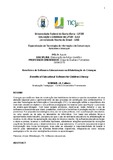| dc.contributor.advisor | Fernández, Edgardo Gustavo | |
| dc.creator | Somavilla, Catiuce | |
| dc.date.accessioned | 2019-10-01T11:53:18Z | |
| dc.date.available | 2019-10-01T11:53:18Z | |
| dc.date.issued | 2010-09-30 | |
| dc.date.submitted | 2010 | |
| dc.identifier.uri | http://repositorio.ufsm.br/handle/1/18457 | |
| dc.description | Artigo (especialização) - Universidade Federal de Santa Maria, Centro de Artes e Letras, Curso de Especialização em Tecnologias da Informação e da Comunicação Aplicadas à Educação, EaD, RS, 2010. | por |
| dc.description.abstract | Children who are in the process of building the skills of reading and writing require a special attention to the
improvement of its process of constructing knowledge. The use of Information and Communication in
education reflects the importance of digital educational materials and teaching practices to enhance the
teaching and learning. Based on these principles, the objective of this study the use of educational software
designed to facilitate, contribute and benefit the written production and reading pleasure. For methodological
approach we chose to practical classes, with the participation of students, in the turn opposite the classroom,
in the computer lab. Based on the studies and presented in this work, we noticed that the use of educational
software in literacy was very effective in the appropriation acts of reading and writing. Based on the studies
and presented in this work, we noticed that the use of educational software in literacy was very effective in
the appropriation acts of reading and writing. Educational software helps the student think, stand up and
confront assumptions, providing opportunities to establish favorable conditions for the cognitive development
of their autonomy. Educational context requires the incorporation of new technologies, but it is the
responsibility of educators to intervene and seek to systematize the various tools available, integrating them
as a teaching resource in order to create favorable conditions for learning. | eng |
| dc.language | por | por |
| dc.publisher | Universidade Federal de Santa Maria | por |
| dc.rights | Acesso Aberto | por |
| dc.rights | Attribution-NonCommercial-NoDerivatives 4.0 International | * |
| dc.rights.uri | http://creativecommons.org/licenses/by-nc-nd/4.0/ | * |
| dc.subject | Alfabetização | por |
| dc.subject | TICs (Tecnologias de Informação e Comunicação) | por |
| dc.subject | Softwares educacionais | por |
| dc.subject | Literacy | eng |
| dc.subject | ICT (Technologies of Information and Communication) | eng |
| dc.subject | Educational software | eng |
| dc.title | Benefícios de softwares educacionais na alfabetização de crianças | por |
| dc.title.alternative | Benefits of educational software for children literacy | eng |
| dc.type | Trabalho de Conclusão de Curso de Especialização | por |
| dc.degree.local | Polo de Agudo, RS, Brasil | por |
| dc.degree.specialization | Tecnologias da Informação e da Comunicação Aplicadas à Educação, EaD | por |
| dc.description.resumo | Crianças que estão em fase de construção das habilidades da leitura e escrita necessitam de uma
atenção especial para o aprimoramento de seu processo de construção dos conhecimentos. O
uso das Tecnologias da Informação e Comunicação (TIC) na educação reflete a importância dos
materiais educativos digitais e das práticas pedagógicas inovadoras para aperfeiçoar o processo
de ensino-aprendizagem. Com base nesses princípios, objetiva-se, neste trabalho o uso de
softwares educacionais que visam possibilitar, contribuir e beneficiar à produção escrita e a leitura
prazerosa. Por proposta metodológica optou-se por aulas práticas, com a participação dos alunos,
no turno oposto ao de aula, no laboratório de informática. Com base nos estudos feitos e
apresentados neste trabalho, percebeu-se que o uso de softwares educativos na alfabetização se
mostrou muito eficaz na apropriação dos atos de leitura e escrita. Os softwares educativos levam
o aluno a pensar, levantar e confrontar hipóteses, estabelecer relações oportunizando condições
cognitivas favoráveis para o desenvolvimento de sua autonomia. O contexto educacional exige a
incorporação das novas tecnologias, mas cabe ao educador a responsabilidade de buscar e
intervir para sistematizar as diversas ferramentas disponíveis, integrando-as como recurso
pedagógico a fim de criar condições favoráveis de aprendizagem. | por |
| dc.publisher.country | Brasil | por |
| dc.publisher.initials | UFSM | por |
| dc.subject.cnpq | CNPQ::CIENCIAS HUMANAS::EDUCACAO | por |
| dc.publisher.unidade | Centro de Artes e Letras | por |



